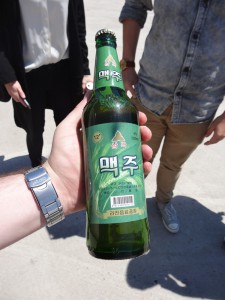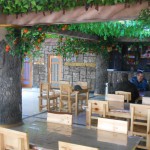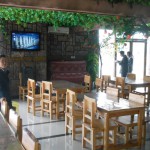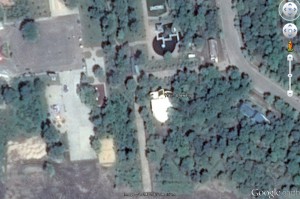UPDATE 4 (2014-2-18): Western tourists are still visiting the restaurant (meaning it has a contract with KITC). The restaurant still has the sign “Rakwon Chicken Specialty Restaurant”, though it is a different color than the original. See tourist video here and here.
UPDATE 3 (2014-2-17): The Hakyoreh updates us on the fate of the inter-Korean chicken restaurant:
In 2005, Choi made his first trip to North Korea to inquire about chicken imports. Soon he had changed plans: he would open his own restaurant there selling South Korean-style chicken. Acquaintances tried to talk him out of it, but he was determined. “I went to Pyongyang and I could see there was money in it,” he recalled. And with economic cooperation between South and North at an all time high, he didn’t see much of a political risk either.
He went back and forth to Pyongyang a few times looking for partners. Finally, in June 2007, he opened up the Rakwon Chicken Restaurant, selling South Korean-style chicken on Puksae Road in the Kaesonmun neighborhood of Moranbong District. His North Korean partner provided the building and staff; Choi was responsible for the interiors, ingredients, recipes, and management system. He reached a deal where he took 70% of profits with a total investment of 500 million won (US$470,000). The opening drew a lot of media attention at the time, with write-ups in the South Korean press and foreign outlets like the Washington Post and Japan’s NHK.
Early on, he did strong business selling at fairly steep prices – the equivalent of US$11.30 for a single bird. His clientele came mainly from the city’s upper class and Chinese visitors. Sales of 100 million won (US$94,000) a year looked to be in sight. “My plan was to open up 100 restaurants in the North,” Choi said.
But in 2008, less than a year after he opened the restaurant, Lee Myung-bak took office as South Korean President. Lee’s administration put a stop to the previous decade’s policies of engagement and cooperation with North Korea, opting for sanctions and containment instead.
“There was a promise between the two sides, and I never thought that would be rejected completely,”Choi said. “Suddenly, that was the reality.”
Bit by bit, exchange ground to a halt. A March 2008 shipment of ingredients through Nampo turned out to be Choi’s last interaction. He had not yet received a single share of revenue.
Then came the announcement of the so-called “May 24 measures” in 2010. Following the sinking of the ROKS Cheonan warship the preceding March, Seoul had called a complete halt to all exchange and economic cooperation with North Korea.
“All the May 24 measures did was drive it home,” Choi insisted. “Most of the economic cooperation had been choked off long before that.”
For the next four years, Choi wasn’t able to set foot in North Korea. Without his support, the restaurant lost its chicken focus and began selling ordinary cuisine. Choi’s other business began to suffer too.
“I’d put my house and buildings up as collateral to borrow the 500 million won to invest in the North,” he said. “Then, to top it all off, there was the US financial crisis. Things began to go downhill rapidly in South Korea, and my business started to fall apart.”
UPDATE 2 (2009-1-1): The BBC offers an update of the new chicken restaurant:
The governments may not be on the best of terms but a South Korean businessman seems to have found a way to North Koreans’ hearts: their stomachs.
Choi Won-ho, the owner of a fried chicken chain, was told he was doomed to fail when he opened his first branch in the impoverished North last year.
But encouraged by his progress so far, he is already preparing to open another one.
Mr Choi runs a fast food franchise in South Korea with a total of 70 stores.
He opened one more last year – no real challenge you might think – except this extension to his fried chicken empire is in the heart of one of the most secretive and business-unfriendly places on the planet.
But Mr Choi says the citizens of Pyongyang have been queuing in front of his shop which is taking around $1,000 a day.
He is now preparing to meet North Korean officials in January to finalise the approval for a second outlet.
His customers are almost certainly all members of North Korea’s elite, a country in which the World Food Programme says up to 9m people will face urgent food shortages this winter.
Relations between the two Korea’s have been at a low since the conservative government of President Lee Myung-bak came to power in the South in February.
North Korea has severed official contacts, stopped all cross-border tourism and restricted entry to a joint industrial zone built with southern money.
But despite the chill, Mr Choi’s fried chicken venture seems to be sizzling.
Read the full story here:
South Korea Chicken Success in NK
BBC
John Sudworth
2009-1-1
UPDATE 1 (2008-11-1): The restaurant is set to open in February 2008. According to Yonhap:
An inter-Korean joint-venture chicken franchise will open its first store in Pyongyang early next month, the head of the franchise’s South Korean partner said Friday.
The store set to open in early February will provide a food delivery service using motorbikes for the first time in the communist country, Choi Won-ho, president of the South Korean company said.
No North Korean restaurants offer food delivery service now, according to defectors from North Korea.
Fried, grilled and steamed chicken dishes as well as draft beer are available for delivery, he said, adding the food will be prepared in the North Korean style.
“I recently received a photo of the store’s interior design from our North Korean business partner, Rakwon General Trading Corporation, along with the offer to open the first store before the 66th birthday of North Korean leader Kim Jong-il,” Choi told Yonhap News Agency by phone. “After opening, I will use radio and newspaper ads to promote the business.”
Kim’s birthday, which falls on Feb. 16, is the most festive holiday in the North.
The North Korean company will provide land, some 20 low-cost workers, chicken, and draft beer. The early-stage investment, equipment, cook and spicy chicken will come from the South Korean chicken franchise called “Matdaero Chondak,” Choi said.
The first “Rakwon” chicken restaurant in Pyongyang will have the capacity of seating about 200 people, he added.
The businessman said he will visit North Korea next week to discuss the opening of the store.
“I hope the business will thrive enough so that we can open store No. 10 in Pyongyang,” he added.
Read the full story here:
Inter-Korean joint venture chicken franchise to open first store in Pyongyang
Yonhap
1/11/2008
ORIGINAL POST (2007-11-3): A South Korean entrepreneur is investing in a new fried chicken restaurant in Pyongyang:
According to Reuters:
A South Korean businessman plans to begin a fried chicken delivery service in the North Korean capital, with the first foreign-run restaurant in a country that struggles to feed its own people.
Choi Won-ho, head of a fried chicken franchiser that has about 70 restaurants across South Korea, said Friday he is opening a 50-table restaurant in Pyongyang on Nov. 15. It will also deliver chicken and draft beer to homes.
“I have wanted to be the world’s best chicken brand,” Choi told The Associated Press in a telephone interview.
“But I thought it makes no sense to conquer the world without sharing food with our compatriots. That’s why I went there first,” he said. “I plan to get into the Chinese market via Pyongyang.”
He laughed off concerns his venture may be too risky in the impoverished and isolated country of 23 million, where the elite citizens of the capital are much better off than others.
“I don’t think that I’m going to lose money at all,” he said.
It will be the first foreign-run restaurant in North Korea, according South Korea’s Unification Ministry.
Choi, 48, who has been in the fried chicken business for 15 years, said he hired an ethnic Korean Chinese as the main cook for the Pyongyang outlet and taught him all his cooking know-how. About 20 North Koreans will also work at the restaurant and five scooters will be used for deliveries, he said.
Choi said he invested about 500 million won (US$551,339, ?382,264) in the joint venture with a North Korean trading firm that will take 30 percent of the profits from the business.
North Korea is one of the poorest countries in the world and has relied on foreign food aid to feed the population for more than a decade since natural disasters and mismanagement devastated its economy.
Relations between the two Koreas have improved significantly since their first-ever summit in 2000, spurring a series of exchange projects between the Cold War rivals that fought the 1950-53 Korean War. That conflict ended in a truce, not a peace treaty, leaving the two sides still technically at war.
According to the Joong Ang Ilbo:
South Koreans are making two very different attempts to improve the culinary life of impoverished North Koreans.
First, a South Korean fried chicken franchise will open the only foreign-run restaurant in North Korea, targeting family dining on special occasions.
Second, the labor union of a South Korean conglomerate has built a plant in Pyongyang to provide cheap corn noodles to northerners who suffer from food shortages.
Choi Won-ho, who runs Matdaero, a 70-store fried chicken franchise in the South, said yesterday he would open a restaurant in a joint venture with a North Korean state-run trading company, near the Arch of Triumph in central Pyongyang on Nov. 15.
The restaurant will both receive walk-in customers and deliver chicken and draft beer to homes. Such places are common in South Korea, but it will be the first chicken joint of its kind in North Korea.
Choi has invested 500 million won ($551,000) in the restaurant’s cooking facilities, interior decoration and delivery scooters. He will split the profit 70-30 with the North Korean firm.
Choi, 48, who has been a chicken entrepreneur for 15 years, said there should be sufficient demand despite North Korea being one of the world’s poorest countries, because he plans to offer lower prices to locals.
“I will charge about $3 for a whole chicken for North Koreans and at least $12, the same price as in South Korea, for tourists from the South and other countries,” Choi said yesterday by phone. “One whole chicken will be enough for a four-member family, so the price of $3 will not be too burdensome for special occasions.”
The store will hire about 20 North Koreans to take telephone orders, fry the birds and make home deliveries. It will have seating for 50.
Separately, the labor union of Hyundai Motor Company, Korea’s top automaker, said in a statement that it has completed an 1,800-square-meter corn-noodle plant in Pyongyang. The plant can produce two tons of corn noodles a day, it said.
Hyundai Motor’s 44,000 unionized workers agreed in August to help a South Korean humanitarian group build the noodle factory. Workers donated about 12,000 won each, 500 million won in total, for the facility.
“The plant will be a great help to relieve the food problems of North Koreans,” Chang Kyu-ho, a spokesman for the labor union, said. “Corn is a staple food for North Koreans.”
Read the full stories here:
Fried chicken franchise goes North
Joong Ang Daily
Moon So-young
11/3/2007
S Korean businessman to debut fried chicken at first foreign-run restaurant in North Korea
Reuters (Via DPRK Studies)
Jaesoon Chang
11/3/2007




